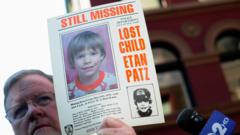The Second Circuit Court of Appeals has ordered a new trial for Pedro Hernandez, who was convicted of murdering six-year-old Etan Patz, a case that has haunted New York City since 1979.
New Trial Ordered for Pedro Hernandez in Etan Patz Case

New Trial Ordered for Pedro Hernandez in Etan Patz Case
A court ruling revives hope for Hernandez, convicted in the infamous 1979 case of a missing boy.
A U.S. appeals court has mandated that Pedro Hernandez, the man convicted in relation to the 1979 murder and disappearance of six-year-old Etan Patz, be granted a new trial or released. The case, which gripped New York City, stems from Patz's disappearance on his way to a school bus stop in the SoHo neighborhood and is one of the most notable missing children's cases in American history.
Hernandez, a convenience store owner, was found guilty in 2017 following a 2015 trial that ended with a hung jury. During his confession, Hernandez claimed he enticed Patz to a basement, where he committed the crime. In his appeal, Hernandez raised concerns regarding improper jury instructions that contradicted U.S. Supreme Court standards and potentially impacted the jury's decision.
The Second Circuit Court noted that the trial court's actions conflicted with federal law, and deemed this error significant. The Manhattan District Attorney's office is currently examining the court's ruling. The case echoed through the years, with campaigns displaying Patz's face on milk cartons nationwide and extensive FBI involvement raising awareness about missing children.
In 2012, after a series of interrogations, Hernandez reportedly confessed to luring Patz with the promise of a drink before committing the act. However, the appeals court pointed out that Hernandez has documented mental health issues and a low IQ, and his confession came following hours of unwarned questioning by police officers. After receiving his Miranda rights, he provided a video confession that became central to his conviction.
The pivotal issue in the ruling was how jurors were instructed regarding the confessions during deliberation, leading to confusion about their validity. While the jurors asked if they could disregard the initial confession deemed involuntary, the judge's instruction not to do so raised significant legal questions. Ultimately, Hernandez was convicted of felony murder and kidnapping but acquitted of intentional murder.
Hernandez's attorney, Harvey Fishbein, expressed gratitude for the ruling and called for the Manhattan District Attorney to drop charges, encouraging a renewed focus on locating the individuals truly responsible for Etan Patz's disappearance.


















